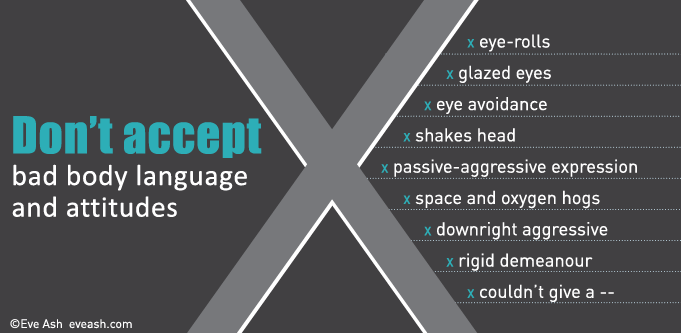For as much as we’ve become such a “selfie” conscious culture, it’s amazing how few people have any awareness of their own bad body language.
When others display bad body language – act, not avoid.
Eye-rolls
This is a huge no-no, irrespective of what’s going in a meeting or mediation. Let’s hope you’re not the culprit. If someone else is doing it on a frequent basis, perhaps politely ask them why they feel the need to do it and what they actual want to say outright.
Glazed eyes
It’s hurtful if you’re presenting and you notice someone with a “lights on but no-one home” expression. See this as an opportunity to improvise a little on your well-rehearsed theme and wake that person up a little, preferably with humour. “I see Joe here is fascinated by the latest sales figures …”
Eye avoidance
Our eyes are enormously indicative of both our emotional state and the state of play in our surroundings.
Observe how some “service-oriented” organisations are anything but orientated to service. You wait in a queue, some minutes have passed and they’re still bustling about, avoiding the gaze of the people they’re intended to serve. This is not a sign of a well-managed business or enterprise.
Service teams with face-to-face customers should respond to those waiting and let them know promptly and pleasantly their request will be attended to as quickly as possible. Avoid insincerity and excuses.
When giving critical feedback, eye avoidance can be as a sign of upset and possible disagreement. Invite the person, nicely, to engage with you and they may begin to warm up.
If you tend to avoid eye contact, train yourself to look at people and engage, instead of being a moody man or madam.
Shaking head
This can happen frequently in meetings and is a sure sign of dissent, no matter how slight the movement is. If you’re chairing the meeting, ask the person to constructively explain their concerns. And if it is you shaking your head, don’t be pathetic – speak up!
Passive-aggressive expression
We’ve all encountered these people. The expression is like a moody volcano preparing to erupt. They feel very put-upon, angry and powerless in equal measure. Their only weapon is to slow down what they’re doing or resort to semi-sarcasm. Find out what’s going on and help put matters right. Encourage them to speak with you or a trusted colleague if they’re unhappy.
Space and oxygen hogs
A somewhat sleepy early morning coffee queue was jolted awake as someone asked loud, endless questions about muffins and snack options, weighing up all against the blueberry muffin. Everyone wanted to shout “just take the blueberry muffin and be done with it!” This person was oblivious to the crowd and the time, with a “take charge” body stance and hands on hips making it worse.
It’s fascinating how some people feel they “own” the space they share with others. Their elbows are everywhere, their voices are loud, they make domineering gestures and some even demand the footpath you’re both walking on.
In confined spaces, it’s best to move away quickly from such people, as sooner or later they will rub someone up the wrong way. If the matter is serious and trouble is imminent, report it quickly. If you work with someone who does this, give them feedback.
Downright aggression
Aggression can take many forms: bodily, sexual, mental and emotional. There’s no interpretation required here: such people are directly courting trouble.
Having the calm confidence to stand your ground with such people is a tall order. If you have what it takes, excellent. If you don’t and you’re concerned about likely consequences, make sure others are aware of what’s going on in order to help bring the bully to heel.
When I had a person in a chair facing the back of the room, aggressively refusing to join in a discussion, I took the person aside at the break and gave two clear options – either join in with respect for others or don’t come back after the break.
Rigid demeanour
Wearing a “don’t talk to me” hat or stiffly arching your neck makes several things clear to others. They certainly will leave you alone.
People are often uptight for a reason, so if you have a colleague like this and it’s affecting the team, take them discreetly aside and tactfully discuss what may be upsetting them.
Couldn’t give a …
We’ve all met at least one of these. They may pretend to be looking directly at you but they have disengaged mannerisms and look past at real or imaginary ‘more interesting’ sights.
If you’ve established this person is being deliberately inattentive and since they’re asserting their “right” not to give a rats, so can you. Politely or pointedly disengage by moving on to others more worthy. Or take your business elsewhere. If this is a member of your team, manage the communication style as it is part of a performance standard and don’t let it slide.
Too many people accept bad body language within their team. If this is you or someone in your team, lead a change away from this bad body language culture.

